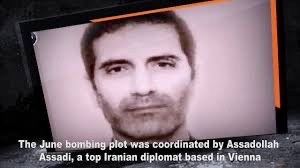By Hanif Jazayeri
Brussels has become the new battleground for combating impunity for Iranian officials; sadly though, the Belgian government is not on the right side.
In March, the government of Belgium quietly signed an agreement with Iran for the transfer of convicted prisoners. While there aren’t many known Iranian nationals in prison in Belgium who would prefer to serve their sentences in an Iranian jail, there is one exception.
Assadollah Assadi, Third Secretary of Iran’s embassy in Austria, is currently serving a 20-year prison sentence in a Belgian jail for attempting to bomb the 2018 annual Free Iran convention in Paris. That event, organised by the National Council of Resistance of Iran (NCRI), was attended by tens of thousands of opponents of the Iranian theocracy and hundreds of international dignitaries including former US House Speaker Newt Gingrich, former Canadian Prime Minister Stephen Harper, former French Foreign Ministers Bernard Kouchner and Philippe Douste-Blazy, and dozens of Members of Parliament, including five from the UK. The keynote speaker was NCRI President-elect Maryam Rajavi.

All of them were potential victims of the bomb plot orchestrated by Assadi on behalf of the Iranian state. In the leadup to the event, Assadi flew in an Austrian Airlines passenger flight from Tehran to Vienna, with a 500-gram TATP explosive device in his diplomatic suitcase. He then handed over the explosives to two would-be bombers at a Pizza Hut meeting in Luxembourg. That pair, based in Belgium, were to travel to Paris posing as NCRI supporters to set off an explosion that if successful would have resulted in mass casualties. Little did Assadi and his cohorts know that they were under surveillance the whole time.
Police moved in and arrested the terrorist pair and a fourth accomplice on the day of the event, while Assadi was nabbed by German police the next day just before he could cross into Austria. Had he crossed over, he would have enjoyed diplomatic immunity, but since Germany was not his country of posting, and since he claimed he was returning from a family vacation in Luxembourg, his diplomatic immunity did not apply. (Diplomats do enjoy immunity while transiting third countries, but only when they are travelling back or forth between their own country and the state where they are posted. They don’t qualify for immunity while on vacation in third countries.)
All four suspects were eventually extradited to Belgium and later found guilty by a Belgian court. The Belgian Judiciary handed down a definitive maximum possible sentence to Assadi and stated that he was acting on behalf of the Iranian state.
Recently, however Iran has stepped up its strategy of hostage diplomacy. It has in recent times arrested a number of European citizens and dual nationals on spurious charges. Accordingly, Iran’s state media have stated plainly that these individuals would only be freed if Assadi is released back to Iran. A lenient approach in this regard would undermine the rule of law in Europe and could also lead to more acts of terrorism.

The Belgian government’s secret treaty with Iran, signed on 11 March 2022, would allow Assadi to serve the remainder of his 20-year sentence in Iran.
Most worryingly, Article 13 of the treaty states: “Each Party may grant pardon, amnesty or commutation of the sentence in accordance with its Constitution or other laws.”
That article would effectively allow the Iranian government to grant pardon to Assadi the moment he steps foot in Iran.
Last week, 68 distinguished current and former EU and UN judges and human rights and legal experts sent an open letter to Belgian Prime Minister Alexander De Croo decrying the scandalous deal and urging his government not to encourage impunity for Iran’s officials by freeing its convicted diplomat.
Signatories to the open letter from 25 countries, among them 17 European countries, included 18 former senior United Nations officials including a former Under-Secretary-General for Legal Affairs and the Legal Counsel of the UN, a former Chairman of the UN International Law Commission, a former President of the UN Special Court for Sierra Leone, and four former UN Special Rapporteurs. Other distinguished signatories included a current Special Adviser to the Prosecutor of the International Criminal Court (ICC), a former President of the European Commission of Human Rights, and a former Council of Europe Commissioner for Human Rights and former Secretary General of Amnesty International.
Distinguished legal experts supporting the letter included an Ad hoc Judge of the European Court of Human Rights (ECHR), three former Judges of the General Court of the European Union, a former President of the OSCE Court of Conciliation and Arbitration, a former President of the Constitutional Tribunal of the Republic of Poland, and a former President of the Constitutional Court of Andorra. Other distinguished signatories included a former Foreign Minister of Canada, a former Attorney General of Portugal, France’s former Human Rights Ambassador, and a former US Ambassador to the UN Commission on Human Rights.
The open letter stated: “Releasing Assadollah Assadi back to Iran would only fuel the culture of impunity that exists for Iran’s officials.”
“Allowing Assadi to serve the remainder of his 20-year sentence in Iran, the state which was responsible for the attempted terrorist bombing, would make a mockery of the rule of law and foster further impunity for the Iranian government and its officials involved in terrorism and crimes against humanity.”
“Transferring Assadi to Iran would effectively free him from serving his sentence and would set a dangerous precedent and seriously weaken the rule of law in Europe. It would encourage more Iranian terrorism on EU soil and reassure Iranian officials that they could evade responsibility for major international crimes. Belgium would bear heavy responsibility in this regard.”
“Following a complaint filed by the NCRI and several international dignitaries, who were the potential victims of the terrorist plot, the Brussels Court of Appeal issued a temporary ruling blocking the transfer of Assadi to Iran.”
The international experts reminded Prime Minister de Croo that UN Security Council resolution 1373, which was adopted after the 9/11 terrorist attacks and which is binding on all UN Member States, decides that all States shall: “Ensure that any person who participates in the financing, planning, preparation or perpetration of terrorist acts or in supporting terrorist acts is brought to justice and ensure that, in addition to any other measures against them, such terrorist acts are established as serious criminal offences in domestic laws and regulations and that the punishment duly reflects the seriousness of such terrorist acts.”
“We strongly urge the government of Belgium to resist Iran’s hostage diplomacy tactics. Rather than helping to foster impunity in Iran by releasing a convicted terrorist, the Belgian government should unequivocally declare that Assadollah Assadi will not be released back to Iran and that he must serve the remainder of his sentence in Belgium,” the open letter added.
Their message was reinforced this week in a separate joint appeal by 21 former European prime ministers and ministers to Prime Minister De Croo, urging his government not to free Assadi.

It would be delusional to believe that Assadi would carry out the remainder of his sentence in Iran and “make a mockery of the rule of law in Europe,” the ministers stated.
Their letter ended with a final plea in which the ministers wrote that “at a minimum, Brussels must make it absolutely clear that the treaty will not apply to terrorists” and that Assadi must stay in Belgium for the remainder of his sentence or for “the sake of the common safety and security of all European nations.”
It’s hard to fathom why in the battle against impunity for Iranian officials, the government of Belgium should be on the side of the guilty party, but now more than ever all advocates of the rule of law should speak up to ensure Belgium does not violate its obligations to international law to placate the world’s chief state sponsor of terror.
Hanif Jazayeri is Secretary of London-based NGO Justice for the Victims of the 1988 Massacre in Iran (JVMI) and a news editor. His Twitter handle is @HanifJazayeri.